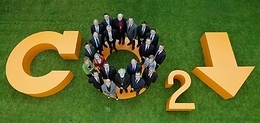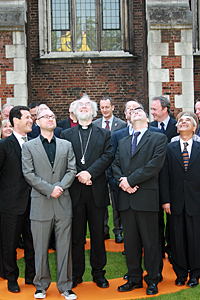Government and business leaders talk climate change at Lambeth Palace
 'Together' event participants
'Together' event participantsTuesday 13th May 2008
The Archbishop of Canterbury Dr Rowan Williams and the Bishop of London the Rt. Revd Richard Chartres welcomed leaders from business, government and civil society to Lambeth Palace today for a Climate Change round table.The event was organised by the Together Campaign, to mark its first anniversary and the round table discussion was chaired by Jon Snow of Channel 4 News. At the event representatives of the Together coalition of business and civil society groups affirmed their ongoing commitment to promoting more green choices for consumers and better environmental responsibility within their organisations. The Church of England is one of Together's founding supporters.
Bishop Chartres, chairman of the Church of England's environmental campaign Shrinking the Footprint said there was a moral imperative to act "both for our children and the poorest of the world."
Dr Williams who has just returned from a visit to Rome by train said climate change was a pressing issue that could not be ignored.
 Speaking after the event Bishop Chartres added: "We are all determined that our children will not say to us in 20 years time – why didn't you do more about the greatest challenge of the 21st Century?"
Speaking after the event Bishop Chartres added: "We are all determined that our children will not say to us in 20 years time – why didn't you do more about the greatest challenge of the 21st Century?"
Dr Williams commended the event: "I support the aims of Together in highlighting how every section of society - from business and government to individuals and civil society- has a role in combating climate change. The Church of England and all people of faith have a central role to play in this. It is no coincidence that only last year the Environment Agency asked 25 leading environmentalists and scientists to list the 50 things they thought could help save the planet and they rated the actions and leadership of faith communities as number 2 - second only to saving energy. By practising what we preach and by putting our own house in order, the Church and all people of faith can make our own contribution to ensuring the safe stewardship of our planet for the generations to come."
Together, which is facilitated by NGO The Climate Group, is a climate change campaign focused on enhancing consumer engagement in green issues - promoting practical things everyone can do, which also aims to make everyday lives easier and more affordable. It is supported by the Church of England and a number of leading companies including Tesco, M&S, O2, Sky, British Gas, B&Q, Barclaycard, More Than and National Express. Representatives of these businesses attended the event, along with several new supporting partners including the National Trust, WWF and Coca-Cola. Government was represented by DEFRA Minister Phil Woolas and Number 10 adviser Michael Jacobs.
A transcript of the Archbishop's speech and his responses to questions from Jon Snow at the round table discussion follow.
'Together' climate change event
Well ladies and gentleman it is my very present duty and privilege to welcome you to Lambeth Palace for what I think will be quite an exciting morning. I gathered, rather to my surprise, that quite a lot of people thought that the involvement of faith leaders in environmental matters was the second most important factor in changing peoples' minds. It is very unusual for faith leaders to be flattered in this way, I am bound to say, but at least one thing we can do is provide a forum where some of these discussions can go forward and where we can collaborate with people who get together quite such a remarkable and unlikely assortment of folk as we have with us for this mornings discussions. In the Church of England we have, for the last couple of years, been thinking pretty systematically about some of the issues around climate change and environmental questions. We have, I think now, twenty five percent of our parishes nationally signed up to doing environmental audits as part of our 'Shrinking the footprint' programme which has been, I think, growing in energy and in resource in the last couple of years. We have an adviser at Church House looking at all of this. We have, well, I'm trying to move our Bishops onto environmentally friendly cars and the Bishop of London and myself have been trying to do our little bit by travelling slowly and conveniently, and rather enjoyably, across Europe to meetings which we would have otherwise have flown to the last couple of years. I came back by train from Rome on Saturday and very nice it was too! You can't quite do it with Singapore but there we are! One step at a time! So, we are very glad not only to be able to welcome you here but to be able to be part of an initiative which I hope is moving towards a tipping point in the world of commerce and industry and general public perception; a tipping point in politics as well where this is recognised for the major moral issue that it actually is. We are glad to be part of that. We are glad to give it encouragement. We are glad quite simply to provide this space for you to come and explore further this morning and it is of course also an opportunity for us quite simply to congratulate those who have organised it for an astonishing achievement in the last twelve months in moving things forward and in drawing people together. Thank you very much.
Questions and answers
After the Archbishop's opening speech, Dr Williams took part in the round table discussion of business leaders and civil community groups which was chaired by ITN newsreader, Jon Snow. Asking the Archbishop for further details of his travel policy, Jon Snow said:
My question to the Archbishop of Canterbury is regarding how your high profile commitment has changed your lifestyle. I wondered: One, whether it costed more money? Two, whether it prejudices your world? And three, whether it is actually improved or damaged your quality of life?
Archbishop of Canterbury: The third is the easiest one to reply. This year it has improved. I think having to think about alternatives to flying, does mean that you have to think about the whole pattern of a timetable and that in itself is a separate problem. The general mentality which is about cramming as much as possible into as little space as possible is just something that I think needs challenging. There are some things, as I said earlier, that I can't do without flying. Next year, you have to look at how the balance lies. This has been an attempt to see what the alternatives are and of course the Bishop of London lead the way last year on just this. Cost is an issue but not an enormous one I think.
Jon Snow: Rome must have been more expensive?
Archbishop of Canterbury: Yes. Ryanair would have been cheaper. And I think I'd have to say it is a work in progress. For next year and the subsequent years we will have to look at the balance but one thing that has emerged this year in a different sort of context is of course, we have got the Lambeth Conference – the major conference of Anglican Bishops – happening this summer which means that a very large number of people will be flying in; so one of the issues which has been in focus for the planning group for that from the beginning has been off-setting. And we now have two schemes which we our implementing in relation to the Lambeth Conference; one which has to do with land reclamation in Burundi and a number of interlocking features of that, the other about reforestation and forward planning about disaster management in Bangladesh so because a thousand plus people will be flying in, there is a lot of work we have to do there. That again is pattern, although it doesn't answer everything, it is a pattern we want to keep working at.
Thank you very much.
